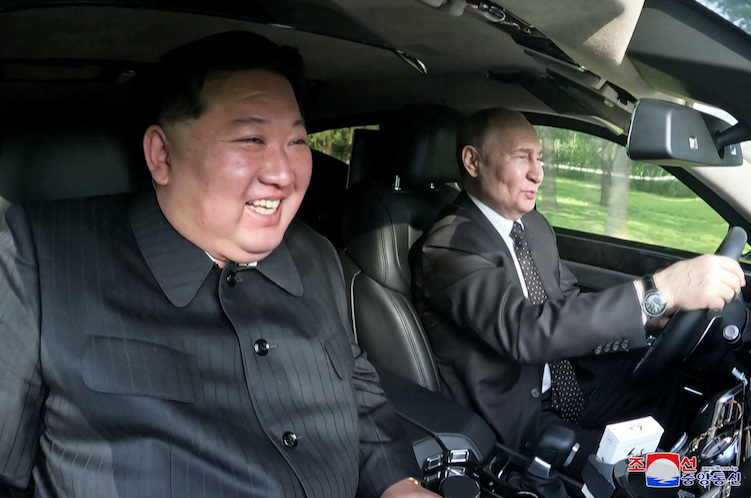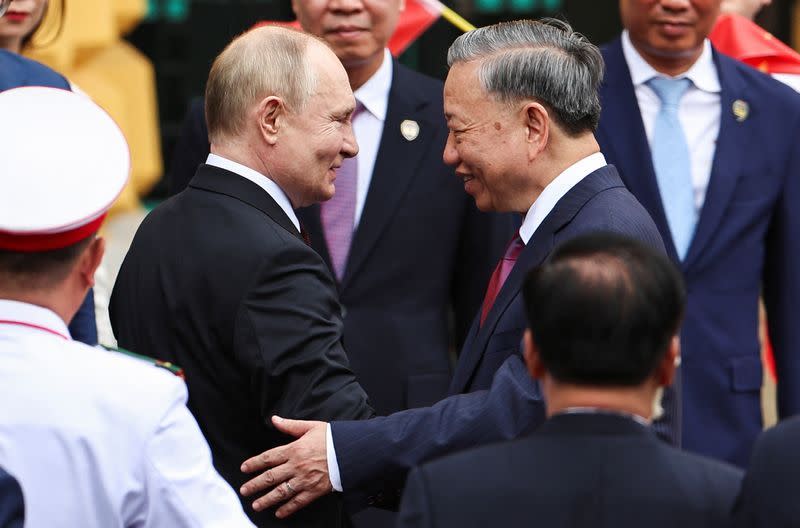A day after signing a mutual defence agreement with North Korea, Russian President Vladimir Putin was in Hanoi getting the red carpet treatment from his long-time communist allies.
For a leader said to have lost over half a million soldiers in Ukraine, this was another brazen display of defiance. As were his words on Thursday – wanting to build “a reliable security architecture in the Asia-Pacific”.
Russia was also keen to partner with the Southeast Asian country in energy and security, with companies ready to invest in liquefied natural gas projects in Vietnam, he said. The Russian leader made the comments in a televised news briefing with Vietnamese President To Lam.
ALSO SEE: Google, OpenAI Scrutinise Staff Amid Fear of China Spying – FT
Earlier, Putin said that strengthening strategic ties is “one of his priorities” as he continued a swing through Asia.
While the “comprehensive strategic partnership” Putin spoke of is the same agreement Vietnam has with the United States and China, his visit has drawn criticism from Hanoi’s Western partners, who have protested that he should not be given a stage on which to defend Russia’s ongoing war in Ukraine.
Putin was welcomed in Hanoi with a 21-gun salute during a military ceremony on Thursday, as he was praised by one of the Communist-run country’s top leaders.
The ceremony is reserved for the highest heads of state and was also rolled out when US President Joe Biden and Chinese President Xi Jinping visited Vietnam last year.
President To Lam congratulated Putin on his re-election and praised Russia’s achievements, including “domestic political stability”, as the two met in Hanoi.
“Once again, congratulations to our comrade for receiving overwhelming support during the recent presidential election, underlining the confidence of the Russian people,” Lam said
The two presidents witnessed the exchange of 11 agreements and memorandums of understanding, including deals on oil and gas, nuclear science and education.
Putin also said he respected dialogue with the regional bloc, the Association of Southeast Asian Nations, in which he said Vietnam played an active role.
Putin, who arrived in the early hours on Thursday, is on the final stop of his two-nation tour of Asia after concluding the defence pact with North Korea. Putin has also visited China since he was sworn in for a fifth term in May.
US, EU criticism
Vietnam’s hosting of Putin was criticised by key partner the United States, which upgraded diplomatic relations with Hanoi last year and is Vietnam’s top export market, and the European Union.
A US embassy statement earlier in the week said no country should be giving Putin a platform to promote Russia’s war in Ukraine.
A spokesperson for the EU delegation in Vietnam said Hanoi had the right to develop its own foreign policy, but said Russia’s war in Ukraine proved Moscow did not respect international law.
Russia was hit with US-led Western sanctions after it invaded Ukraine in February 2022 in what Moscow calls a “special military operation”.
In March 2023, the Hague-based International Criminal Court’s issued an arrest warrant for Putin over alleged war crimes in Ukraine, charges he denies. Neither Vietnam nor Russia are members of the ICC.

Russia-North Korea military pact
On Wednesday, the Russian leader – on his first visit to Pyongyang in 24 years – and his North Korean counterpart Kim Jong Un signed a defence pact, which said they agreed to provide immediate military assistance if the other side faced armed aggression.
The pledge is seen as the revival of a mutual defence agreement under a 1961 treaty adopted by the Cold War allies that was annulled in 1990 when the Soviet Union established diplomatic ties with South Korea.
The agreement for a “comprehensive strategic partnership” is one of Moscow’s highest-profile moves in Asia in years.
“If either side faces an armed invasion and is in a state of war, the other side will immediately use all available means to provide military and other assistance in accordance with Article 51 of the UN Charter and the laws of each country,” Article 4 of the pact says.
Article 51 of the UN Charter provides for the right of a member country to take individual or collective self-defence actions.
The pledge by the leaders of the two countries, which are facing increasing international isolation, comes amid growing concern among the United States and its Asian allies over how much Russia would support North Korea, the only country to have tested a nuclear weapon this century.
Kim echoed Putin’s statement explicitly linking their deepening ties to fighting the “hegemonic and imperialist” policies of the West and the United State in particular, including its support for Ukraine.
The agreement also said neither side would sign any treaty with a third country that infringes on the interests of the other and will not allow its territory to be used by any country to harm the other’s security and sovereignty, KCNA said.
The two countries will take joint actions aimed at “strengthening defence capabilities to prevent war and ensure regional and international peace and security”, it said.
Moves alarm with West, Japan and Seoul
Japan expressed “grave concerns” about Putin’s vow not to rule out cooperation with Pyongyang on military technology.
Washington and Seoul have been increasingly alarmed by deepening military cooperation between Russia and the North, and have accused the two of violating international laws by trading in arms for use in Moscow’s war against Ukraine. Ukrainian officials have said they have found North Korean missile debris inside their country.
Russia and North Korea deny any arms trade.
Putin thanked Kim for his support for Russian policy, and Kim reaffirmed “unconditional” and unwavering support for “all of Russia’s policies” including Putin’s war with Ukraine.
KCNA on Thursday released the full text of the agreement, which also included cooperation on nuclear energy, space exploration, food and energy security.
Cha Du Hyeogn, a former South Korean government official who is now a fellow at Asan Institute for Policy Studies in Seoul, said the mutual defence pledge is similar to the North’s 1961 treaty with the Soviet Union.
It was not clear whether the agreement would constitute an alliance. “It comes from Kim wanting to put everything in for this agreement, while Putin is being reluctant to do so,” Cha said.
- Reuters with additional input and editing by Jim Pollard
ALSO SEE:
Vietnam’s Internet Cables ‘Down’, Days Before Putin Visit
Putin Wants Chinese Banks to Help Military Parts Trade – FT
US ‘Looking Closely’ at China Banks Over War Aid to Russia
China Providing 90% of Chips Used in Russia, Despite Sanctions
Chinese, Russian Firms Agree Multiple Deals as Ties Deepen
Chinese Loans to Russia Quadruple Since Ukraine War – FT
20 China Firms Among 300 Sanctioned by US Over Russian War
China-Russia Trade ‘Goes Underground’ as Big Banks Pull Back
NATO Warns China: Good Ties at Risk, if You Keep Backing Russia
























